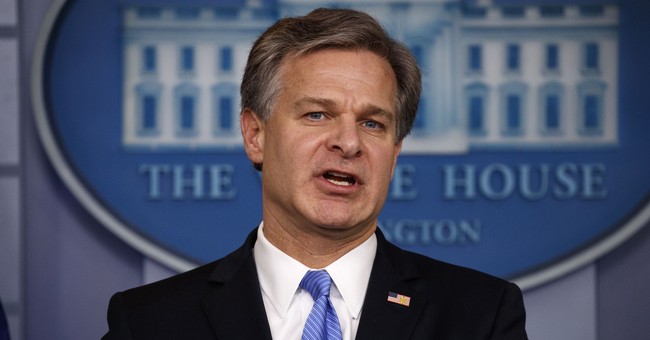
The announcement on Friday that FBI Dir. Christopher Wray has ordered the FBI Inspections Division to look into the FBI’s activity in the investigation of General Michael Flynn was met with quite a bit of skepticism and cynicism. I made some efforts on Twitter to convince readers that, within the FBI, the Inspections Division is taken seriously, and their arrival at a particular field office is normally a circumstance filled with dread.
Based on my own discussions with FBI agents over the years, the general sentiment from the “rank and file” in the offices subjected to inspections is that they believe the inspection team shows up knowing that certain people have been targeted for “scrutiny”, and that a visit from the Inspections Division is really to “collect some scalps”.
I think a bit of background on how inspections in the FBI are conducted might help readers understand why I have this view. I welcome various former FBI agents who follow my writing here and on Twitter to weigh in with their views and experiences since they have all been subjected to this process more than once in a 20+ year career. Inspections of Field Offices are usually scheduled on a rotation, and happen every 3-4 years for each Field Office, although unscheduled and out-of-cycle inspections do happen with some regularity. Dir. Wray’s announcement is an example of the latter.
It’s important to understand who the Inspectors are, why they are part of the team, and their own motivations for being aggressive in their search for malfeasance. While there is an “Inspection Division” at FBI HQ, and the “Leaders” of Inspection Teams work out of that office, the bulk of the actual Inspectors are supervisory personnel from other Field Offices around the country and from FBI HQ. Depending on the size of the office undergoing the inspection, the number of Inspectors can range anywhere from 20 to 100, and the process can take anywhere from 10 days to two weeks (except in the cases of Miami, San Diego, Las Vegas, and Honolulu, in which case the end date of the inspection is always TBD, but not prior to the day after the end of a three-day holiday weekend, Christmas vacation, or Spring Break. Anchorage gets the same treatment but only in the summer months).
And, as important as the size of the Inspection Team is, the fact is that being part of “Inspections” is a requirement for every FBI Supervisor who wishes to be promoted to the next level up in FBI management. There are requirements in terms of the number of inspections a supervisor must participate in before being eligible for promotion to the next level. The one I’m most confident of is that a “Supervisory Special Agent” (SSA) — or Squad Supervisor — must participate in three inspections before he/she will be considered for promotion to Assistant Special Agent in Charge (ASAC). So it is quite common for newly minted SSAs to immediately begin volunteering for “Inspection Duty” where they can be picked to travel to another Field Office for the purposes of conducting an inspection.
Further, members of the Inspection team are generally “motivated” to find problems. A supervisor who participates in an inspection, but fails to identify problems in need of correction might be considered to be insufficiently attuned to spotting operational deficiencies. The failure to find such problems as part of an inspection can be seen as an unfavorable attribute when the supervisor is considered for promotion — if he/she was unable to spot problems and correct them as an inspector, why would he/she be a good candidate to spot problems and correct them as a supervisor at the next level? So, the “bias” of an Inspector tends towards finding problems during the course of the inspection — not giving everyone a “clean bill of health.”
From an “objective” point of view, the role of the Inspectors might be described as looking over operations of the Field Office in order to confirm that all FBI policies and regulations are being complied with, and what better practices and habits might be suggested. From a “subjective” point of view, the more common perspective is that the Inspectors arrive aware of problems based on previous reporting, and the purpose of the inspection is simply to document the misconduct and “bag” those responsible. The announcement of an inspection into the Flynn investigation sure sounds like the latter.
Why do I say that? Because in the modern Bureau with all electronic databases, before they even arrive on scene, the Inspection Team have had full access to all the records of the case file(s) that are going to undergo scrutiny. They don’t arrive on the scene with an empty notebook, read through the case file, and document what they discover. They arrive on the scene already armed with evidence of the likely misconduct that is the reason they were sent there.
The Inspection Team will have ALL that information — A to Z — before they land and start reviewing the case. They will conduct interviews of EVERYONE who had any contact with the file — supervisors, agents, analysts, and staff. They will ask questions about every decision made, every action taken, and every decision to not take action. After 2-3 days, the Inspection Team leaders will begin assembling their report from the early interviews, and the draft of the report will be discussed with the Inspection Team. Based on preliminary findings, further inspection might be undertaken. This is a laborious process that requires the gathering of a significant amount of information in a short period of time, and aggregation of that information into a report that can be produced to the Director for consideration and action.
So, why shouldn’t folks be cynical and conclude this is too little, too late, and nothing more than an attempt by Dir. Wray to “whitewash” the conduct of FBI officials in the Flynn investigation by sweeping it under the rug?
First, given the ongoing nature of the Special Counsel investigation until March of 2019, it would have been difficult for Dir. Wray to announce an investigation of the FBI’s conduct of that investigation given the “independence” of the Special Counsel’s office under DOJ regulations.
Second, when Attorney General Barr tasked U.S. Attorney John Durham with looking into the origins of the Crossfire Hurricane investigation — and part of the focus of that investigation involved the investigation of Gen. Flynn — it would have been ill-advised to have the FBI Inspections Division initiate its own investigation of FBI conduct at the same time U.S. Attorney Durham was conducting a criminal investigation that involved many of the same people. There was already an IG investigation underway on the narrow issue of the FISA applications, whereas Durham’s investigation is thought to be much broader. Having a third parallel investigation conducted by the FBI Inspection Division, where the same people would be interviewed or targeted yet again is simply not a wise idea. In that situation, the administrative review is always going to wait for the criminal investigation to be completed. AG Barr has made frequent references recently to the Durham probe coming to the end of its investigative phase, and the timing of Dr. Wray’s announcement may be tied to that fact.
Finally, the recent disclosures with regard to information in the FBI and/or SCO’s files about documents bearing on FBI conduct that were never produced as part of the case against Gen. Flynn raise serious questions about compliance by FBI agents with their obligations in criminal cases. While it has been reported that Dir. Wray opposed disclosure of the records to Gen. Flynn and his counsel based on his disagreement that they constituted “Brady” material, that does not mean that he has been aware that those records existed. It may be the case that the discovery of those records — likely in the SCO’s file — by U.S. Attorney Jensen came as a surprise to Dir. Wray. This discovery might have been the impetus for his decision to subject the FBI’s conduct in the Flynn investigation to an inspection.
But the broader review of FBI conduct, of which the Flynn investigation is just one component, reveals a series of public relations fiascoes over the past several years. Dir. Wray understands better than anyone that the Bureau cannot regain the trust of the public unless it gets its own house in order in a very public way. It cannot rely on a criminal investigation that may or may not find crimes that can be prosecuted. To regain the public’s trust, the Bureau has to “clean house”. In some measure, that has been accomplished. There is a long list of names of “former” FBI officials, and not all of them left as a result of voluntary retirement. But it’s quite likely that there is more to be accomplished in that regard.
But as important as regaining the public trust – and maybe more important to Wray’s success as FBI Director – is the need for Wray to communicate to the rank and file agents through his actions that the rules and procedures they are expected to live by apply to individuals in management and supervisory roles as well.
A Special Agent who conducts a subject interview without having a properly predicated and approved basis for doing so is subject to disciplinary action – including possible termination. These are “black letter” rules that working squad agents are held to, and failure to comply can cost them their careers. So when an SSA like Joe Pientka and a Deputy Assistant Director of Counterintelligence like Peter Strzok venture out to conduct an interview of the National Security Advisor on the basis of an “iffy” predication of a possibly-still-open-but-maybe-closed counterintelligence investigation, and nothing happens to them because they are “management” – that is hard for the working agents to accept.
And it does not matter that the Director or Deputy Director tasked them to do the interview. The rules apply to everyone, or they apply to no one. It’s up to Wray to make it clear to Special Agents across the country which one of those is true.















Join the conversation as a VIP Member